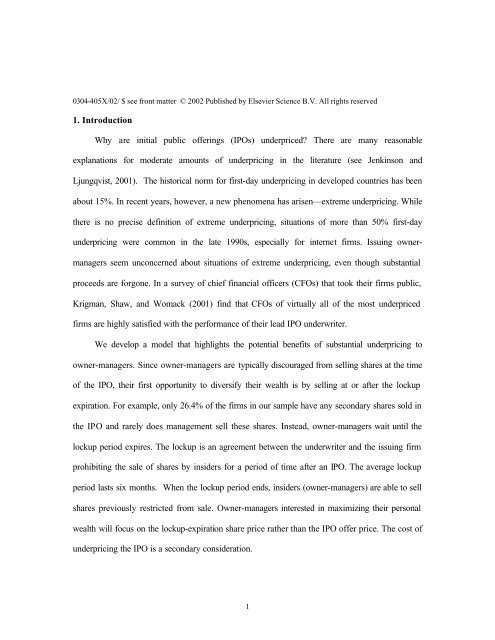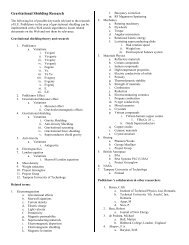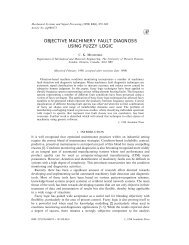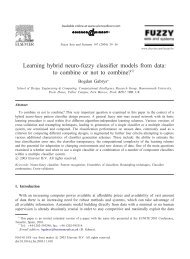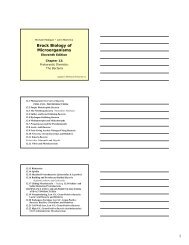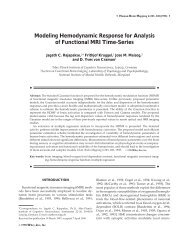Strategic IPO underpricing, information momentum, and lockup ...
Strategic IPO underpricing, information momentum, and lockup ...
Strategic IPO underpricing, information momentum, and lockup ...
Create successful ePaper yourself
Turn your PDF publications into a flip-book with our unique Google optimized e-Paper software.
0304-405X/02/ $ see front matter © 2002 Published by Elsevier Science B.V. All rights reserved<br />
1. Introduction<br />
Why are initial public offerings (<strong>IPO</strong>s) underpriced? There are many reasonable<br />
explanations for moderate amounts of <strong>underpricing</strong> in the literature (see Jenkinson <strong>and</strong><br />
Ljungqvist, 2001). The historical norm for first-day <strong>underpricing</strong> in developed countries has been<br />
about 15%. In recent years, however, a new phenomena has arisen—extreme <strong>underpricing</strong>. While<br />
there is no precise definition of extreme <strong>underpricing</strong>, situations of more than 50% first-day<br />
<strong>underpricing</strong> were common in the late 1990s, especially for internet firms. Issuing ownermanagers<br />
seem unconcerned about situations of extreme <strong>underpricing</strong>, even though substantial<br />
proceeds are forgone. In a survey of chief financial officers (CFOs) that took their firms public,<br />
Krigman, Shaw, <strong>and</strong> Womack (2001) find that CFOs of virtually all of the most underpriced<br />
firms are highly satisfied with the performance of their lead <strong>IPO</strong> underwriter.<br />
We develop a model that highlights the potential benefits of substantial <strong>underpricing</strong> to<br />
owner-managers. Since owner-managers are typically discouraged from selling shares at the time<br />
of the <strong>IPO</strong>, their first opportunity to diversify their wealth is by selling at or after the <strong>lockup</strong><br />
expiration. For example, only 26.4% of the firms in our sample have any secondary shares sold in<br />
the <strong>IPO</strong> <strong>and</strong> rarely does management sell these shares. Instead, owner-managers wait until the<br />
<strong>lockup</strong> period expires. The <strong>lockup</strong> is an agreement between the underwriter <strong>and</strong> the issuing firm<br />
prohibiting the sale of shares by insiders for a period of time after an <strong>IPO</strong>. The average <strong>lockup</strong><br />
period lasts six months. When the <strong>lockup</strong> period ends, insiders (owner-managers) are able to sell<br />
shares previously restricted from sale. Owner-managers interested in maximizing their personal<br />
wealth will focus on the <strong>lockup</strong>-expiration share price rather than the <strong>IPO</strong> offer price. The cost of<br />
<strong>underpricing</strong> the <strong>IPO</strong> is a secondary consideration.<br />
1


